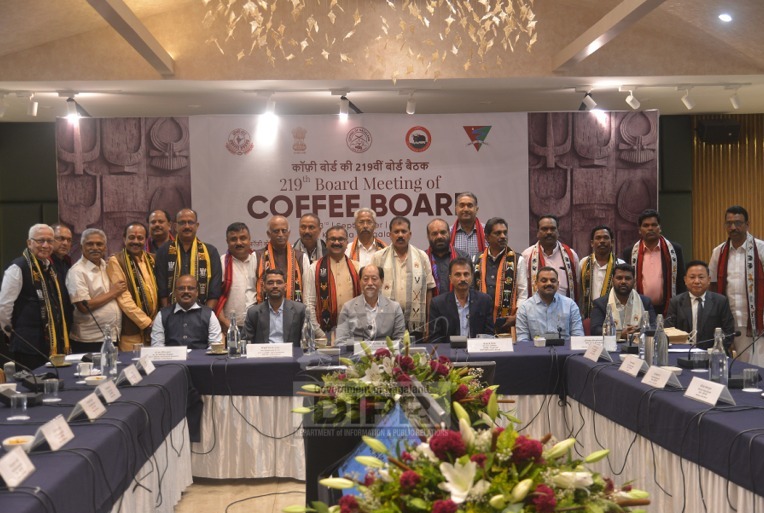Chief Minister Neiphiu Rio highlighted the vast potential for coffee cultivation in Nagaland during the 219th Coffee Board Meeting.
Share

DIMAPUR — The 219th Coffee Board Meeting, hosted by the Department of Land Resources, was held on Wednesday at Hotel Vivor, Kohima, with Chief Minister Neiphiu Rio and members of the Coffee Board of India (CBI) present.
The meeting discussed the revival of coffee cultivation in Nagaland, its potential for over 10 lakh hectares of plantation, the role of farmers in producing organic coffee, and the challenges of industrial growth in the state.
A DIPR report stated that Rio, while addressing the CBI members, said coffee plantations started somewhere in the 1980s with the support of the Coffee Board of India but failed not because of the farmers but because the CBI could not manage it.
Also read: District-Level Teachers Award recipients announced for Kohima and Meluri
With the CBI coming back and helping the Department of Land Resources to regrow coffee, he hoped that the state would produce a lot of coffee, as there is potential for coffee plantations in more than 10 lakh hectares. He added that "Viksit Bharat 2047" could also provide an opportunity to make coffee an identity of the state of Nagaland. He also said the farmers of Nagaland produce exotic fruits such as avocados, persimmons, kiwis, dragon fruits, and pineapples.
Rio stated that another issue that needed to be worked upon in the state is the Naga political issue, which has resulted in no investors coming to the industries of the state. He mentioned that the Nagaland Paper Mill, partnered with Hindustan Paper, a huge corporation, had failed and could not be revived, leaving the bamboos that were rolling out to go to waste.
Similarly, the Sugar Mill Factory in Dimapur failed due to congestion and lack of cultivation space for sugarcane. However, he assured that while it may take time for industries to come into the state, there is potential as raw materials are locally available without transportation problems.
He added that raw materials cannot be imported due to production quality and price competition. He further mentioned that the state has huge deposits of petroleum, natural gas, rich minerals, and mountains of lime and marble.
The CM emphasised that without industries and imports, the most viable potential lay in the farmers themselves. If they could utilise the soil and land for coffee production, the state, which prohibits the use of fertilisers, could produce organic coffee.
He also asked the members, when they go for field visits, to interact with and motivate the farmers, provide various trainings to produce quality coffee beans, and supply nursery plantation materials.
The members would be holding meetings with different stakeholders and would also be visiting coffee plantation farms during their three-day stay in the state capital.
The members of the CBI arrived in Nagaland on September 2. Before departing for Kohima, the members visited Juro Roastery & Juro Coffee House at City Square Complex in Chümoukedima.
The purpose of the visit was to understand the progress and development of coffee in the northeast region, especially Nagaland. Additionally, the visit aimed to learn how coffee entrepreneurs are growing, the challenges they face, and to explore the scope of coffee in the local market and market linkages.
The team is being headed by MJ Dinesh.